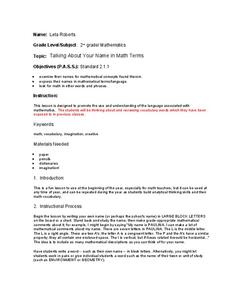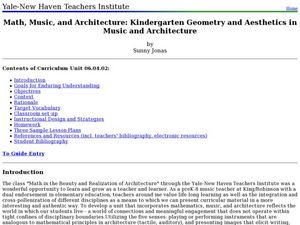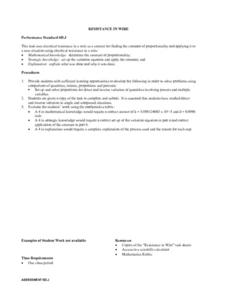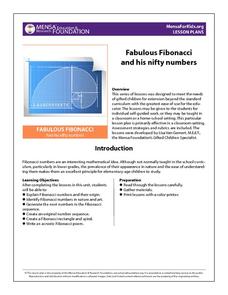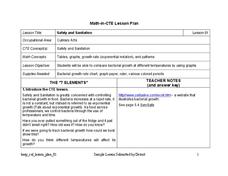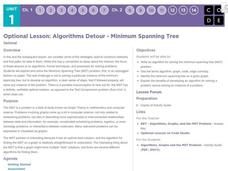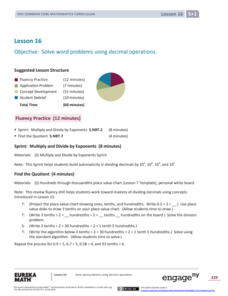Curated OER
Writing Numbers in Decimal Form
Students explore the concept of writing numbers in decimal form. In this writing numbers in decimal form lesson, students convert a number in word form to decimal form.
Curated OER
Ten in the Bed
First graders share the story "Ten in the Bed". They rewrite the story so that the initial character is calling others to bed. There was one in the bed and the little one said, "Come to bed, come to bed." There were two in the bed and...
Curated OER
Math in Nature
Students explore math in nature. In this lesson on the Fibonacci sequence, students use natural objects and Fibonacci numbers to discover mathematical patterns.
Curated OER
Talking about your name in math terms
Students talk about mathematical language. In this talking about your name lesson, students use the letters in their own name to review math vocabulary and concepts.
Curated OER
Math, Music and Architecture: Kindergarten Geometry and Aesthetics in Music and Architecture
Students identify and name different geometrical shapes. In this math lesson, students distinguish odd from even numbers. They describe the properties of 2 and 3 dimensional objects.
Curated OER
Resistance in a Wire
Students find the constant of proportionality and apply it to a situation. They use the electrical resistance in a wire as a context for finding the constant of proportionality. In addition, they write an explanation and justification of...
Curated OER
Once Upon A Math Story
Students write a math story. In this math operations and writing lesson, students work in small groups to brainstorm ideas for a math story, write a rough draft, revise their story, edit their story and add clip art. Students...
Curated OER
There's No Accountin with Ledgers
Tenth graders create and maintain a ledger, write an essay for the process, and learn to keep financial accounts through the ledger. In this ledger instructional activity, 10th graders define an accounting ledger and create one for the...
Curated OER
Writing in Math Class
Students brainstorm and discuss ways math is all around them, explain in writing how they solve math problems, describe mathematical ideas in writing, and create original story problems.
Curated OER
Descriptive Writing
Pupils practice descriptive writing. In this unique writing lesson, students hear a story about a mitten. Then three grade levels come together to first, create a mitten on KidPix; second, describe the designed mitten; and third, try to...
Illustrative Mathematics
Guess My Number
Make a game out of solving equations. This particular activity works well for pairs of learners. Follow the instructions to have player one pick a number and player two verbally give an equation. Participants need to make sense of a...
The New York Times
Understanding the Mathematics of the Fiscal Cliff
What exactly is the fiscal cliff? What are the effects of changing income tax rates and payroll tax rates? Your learners will begin by reading news articles and examining graphs illustrating the "Bush tax cuts" of 2001 and 2003. They...
Curated OER
Leaders, Laborers, and Other Perspectives of World War II
How did the women in France feel about their country’s involvement in World War II? Class groups are assigned a country involved in WWII, and individuals within the group adopt the point of view of leaders, laborers, businessmen, women,...
EngageNY
Numbers in Exponential Form Raised to a Power
Develop an understanding of the properties of exponents through this series of activities. This third lesson of 15 explores the patterns associated with the power property. Scholars expand the powers before applying the property.
EngageNY
Successive Differences in Polynomials
Don't give your classes the third degree when working with polynomials! Teach them to recognize the successive differences and identify the degree of the polynomial. The activity leads learners through a process to develop an...
EngageNY
Linear Equations in Two Variables
Create tables of solutions of linear equations. A lesson has pupils determine solutions for two-variable equations using tables. The class members graph the points on a coordinate graph.
MENSA Education & Research Foundation
Fabulous Fibonacci and His Nifty Numbers
Fibonacci numbers are not only found in the classroom but also in nature. Explore the concept of Fibonacci numbers through a series of lessons designed to gain insight into the mathematical reasoning behind the number pattern, and spark...
Virginia Department of Education
How Much is that Tune?
Tune in for savings! Scholars investigate pricing schemes for two different online music download sites. After comparing the two, they determine the numbers of songs for which each site would be cheaper.
National Research Center for Career and Technical Education
Safety and Sanitation
Your microbiologists explore the graphing of exponential growth functions using bacteria, like e. coli and salmonella, in a well-written, career and technology lesson.
Willow Tree
Approximating a Line of Best Fit
You may be able to see patterns visually, but mathematics quantifies them. Here learners find correlation in scatterplots and write equations to represent that relationship. They fit a line to the data, find two points on the line, and...
Curated OER
Compare and Contrast Night to Life is Beautiful
After reading Elie Wiesel's Night, watching the movie Life is Beautiful, and researching World War II, class members write a comparison essay on the book and film. This includes a prior knowledge activity, discussion in whole and small...
Curated OER
Multiplication: Bugs Can Multiply, So Can I!
Develop multiplication skills with your class. Youngsters will visualize multiplication as repeated addition. Then they will create a multiplication bug book and discover arrays as a strategy for multiplication problem solving....
Code.org
Algorithms Detour - Minimum Spanning Tree
This optional lesson plan introduces the class to the idea of a minimum spanning tree. The activity focuses on determining an algorithm that will find the most efficient path in a network to transfer data.
EngageNY
Grade 5 Math Module 1, Topic F, Lesson 16
See, decimal operations do come in handy! Pupils solve word problems that require adding, subtracting, multiplying, and dividing decimals. They use tape diagrams to express relationships and to identify the necessary operations to solve...



